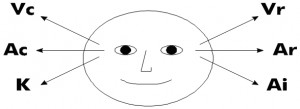How To Spot a Lying Interviewer
Most job hunters see the interview as a one way process – the employer deciding if they want to hire you!
But in truth the interviewer is already interested in you, which is why out of, on average, 300 applicants you are one of six candidates the interviewer has invited to interview.
In the job interview, you do need to sell yourself, build rapport and make a lasting impression, but also the interview is about you deciding whether or not you want to work for this particular employer.
Employers know that if they recruit the best candidate it can make a real difference to their profits. This is why at the job interview start, the interviewer will give an overview of the organisation highlighting the key selling points from an employees point of view, as well as giving a future forecast of key goals, to create the positive impression that this is the company you should work for.
Throughout the job interview you will ask the interviewer questions, keeping a flow to the job interview. It is these answers that will help you decide, once you have been offered job positions with several competitive organisations, which company you want to work for.
When listening to the employers answers you need to be sure that the interviewer is being truthful, rather then spinning a lie just to ensure you will accept the job offer. If you accept a position only to find that the employer has lied, you will need to restart that time consuming and stressful process of job searching, it is far better to learn how to read the interviewer and spot liars.
Set Up Your Own Coaching Business
Below you find some telltale giveaways that will help you spot which interviewer is lying to you.
When reading interviewers you need to look for clusters of telltale giveaways, rather then making a judgement on just one expressions or body movement.
Spotting Liars – The Basics
- Body language – when being truthful people will use a wide range of hand expressions and movements as people often talk with their hands. Liars will subconsciously limit their arm movements looking more stiff then natural
- Touching Lips – when lying we unconsciously try and stop the lie from coming out by covering our mouths, watch for the lying interviewer touching their nose, lips or ears when lying.
- Red Faced – liars tend to get hot “hot under the collar.” The deceitful interviewer can become red-faced or may pull on their collar to cool down, others will scratch their neck when lying
- Moving Away – liars will often feel uncomfortable lying to your face and will subconsciously turn their body away from yours wanting to get away quickly
Spotting Liars – Reading the Interviewer
- Timing – often a liar will say something and then follow this up with an emotion or gesture, while truthful people will say something and make the gesture at the same time. Gestures are often off pace when lying, emotional displays are delayed and then suddenly stop
- Defensive – a guilty person will often get defensive in conversation, where as innocent people often become offensive. When questioning an interviewers answer, to collect more details, listen for defensive words
- Building Barriers – Liars will often want to hide away from you, protecting them and will build barriers between you and them; an interviewer may hold a folder/collection of papers in front of themselves, creating a “barrier” between them and the interviewee
Spotting a Liar – Hearing Lies
- Copy Cat – liars will often copy the exact words you use to answer a question “are you likely to gain a continuation in the contract” Liar: “Yes, we are likely to gain a continuation in the contract” A truthful interviewer is more likely to answer with more details “Yes we have good change, the contract manager is really happy with our results to date, they had to put the tender out to contract due to the duration of contract…”
- Sticking to the Facts – truthful people will often tell a story and as the story is progressing will naturally go off on a tangent, liars will tell a “well planned story” in a more factual way without any additional “add-ons” example “Yes, we do invest in staff development”
- Not Answering the Question – many people don’t like to lie, and instead of lying will answer a different question or just imply an answer
- Distancing Language – liars will often use distancing language, with Bill Clinton famously saying “I did not have sex with that women” rather than saying her name, he distanced himself using the word “that” to avoid thinking about the person/situation.
Spotting Liars – Watch the Interviewers Eyes
When asking a question you can watch the interviewers eye movements to detect if the person is remembering or constructing a thought. When questioning a liar, you can ask the person several truths to gain a baseline and then ask them a question to see if they are lying (accessing constructed images, rather then creating a believable answer)
*This technique needs to be used in context, as some of your questions will need a “constructed” answer, also be aware that some people will accessing memories/creative thoughts opposit to the image above
- Looking Up and to the right-Visual Remembered
- Looking up and to the left-Visual Constructed
- Looking to the Right (towards ears) -Auditory Remembered
- Looking to the Left (towards ears) – Auditory Constructed
- Looking down to the Right – Auditory Digital
- Looking Down to the Left-Kinaesthetic




